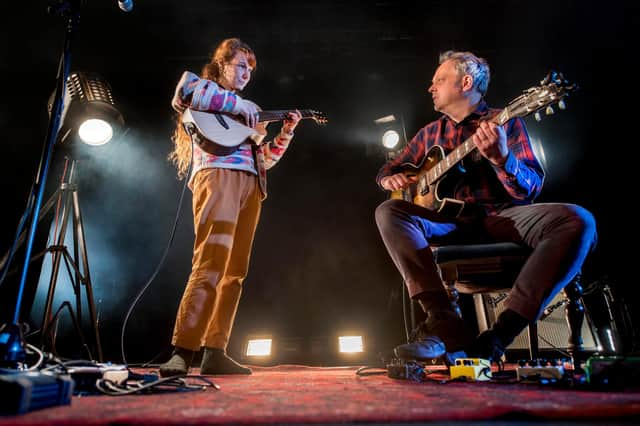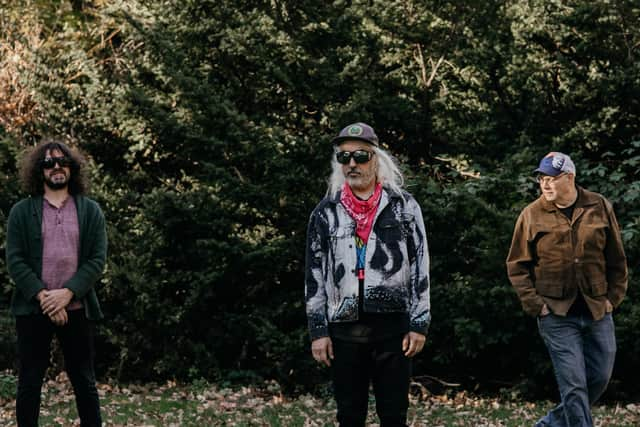Album reviews: Ensemble Eòrpa | Rhiannon Giddens | Declan O'Rourke | Dinorsaur Jr


Ensemble Eòrpa: Abode (self-released) ****
Rhiannon Giddens with Francesco Turrisi: They’re Calling Me Home (Nonesuch) ****
Declan O’Rourke: Arrivals (Eastwest) ****


Dinosaur Jr: Sweep It Into Space (Jagjaguwar) ****
One of the artistic highlights of this last lockdown year was making the musical acquaintance of the extraordinary Lizabett Russo, a Romanian singer/songwriter now based in Edinburgh, whose latest album While I Sit and Watch This Tree is an utterly beguiling elemental missive.
Advertisement
Hide AdAdvertisement
Hide AdRusso has swiftly followed up by forming Ensemble Eòrpa, a group of musicians hailing from Bulgaria, Romania, Germany and the Netherlands, collaborating and contributing remotely from their respective homes. Their appropriately titled album, Abode, was conceived, written and recorded with Russo and her partner, guitarist/composer Graeme Stephen during their lockdown residency at Huntly-based Deveron Projects, culminating in a livestream launch on 15 April.
Its array of evocative instrumentals, adaptations and original songs were inspired by the local Aberdeenshire landscape and delivered with pan-European instrumentation, particularly mining Russo’s Balkan roots.


The bothy ballad Bogie’s Bonnie Belle kicks off the project and the album – its ill-starred heroine Isabella Morrison was reputed to live in the premises where the album was recorded and, heralded by the haunting drone of Lucas McIntosh’s bagpipes, Russo sings her sad affair with an engagingly accented blend of wistful reverie and childlike directness which also suits Peace Song, her gossamer adaptation of Ed McCurdy’s anti-war standard Last Night I Had the Strangest Dream.
An ancient well on Gartly Moor is the inspiration for 11-minute folk noir meditation The Well, embellished by Russo’s bewitching ululation, while the region’s river landscapes are evoked through the undulating chime of Marius Mihalache’s cimbalom on Heron, Silke Eberhard’s lithe saxophone on Streams and the dexterous flow of Nedjalko Nedjalkov’s kaval on Currents. This Balkan shepherd’s flute also complementsRusso’s soaring songbird pipes on Same Sky and all parties come together in the sad, stately dance of Wisdom of the Forest.
The much lauded American singer Rhiannon Giddens has also assembled an international line-up for her second album with Italian multi-instrumentalist Francesco Turrisi, including Congolese guitarist Niwel Tsumbu and Irish piper Emer Mayock. But where Russo glides in air and water, Giddens is all earth – with one eye on heaven.
Through the timeless resonance of her vocals, she collapses the pandemic gap between loved ones on Calling Me Home’s gospel blues title track, rages against the dying of the light with O Death’s determined plea for mercy and calls for unity in the hereafter on original song Avalon, which weaves together middle eastern, north African and European musical strands.
Elsewhere on her musical travels, she picks up Celtic instrumental Bully For You, the Appalachian flavours of Waterbound and Italian lullaby Nenna Nenna before coming to rest with a hum and thrum instrumental rendition of Amazing Grace, leaving the listener to fill in the emotive lyrical blanks.
Advertisement
Hide AdAdvertisement
Hide AdLike Giddens, Dublin singer/songwriter Declan O’Rourke is a yearning soul with a quiet authority. His latest album Arrivals, produced by famous fan Paul Weller, is populated with original songs you feel you’ve heard before, such is the integrity of his simultaneously soothing yet aching storytelling.
Languorous piano and forlorn fiddle grace the title track, while Convict Ways is more departures than arrivals, acknowledging the transported “slaves without the names of slaves”. His quiet rage is replaced by melancholy romance on This Thing That We Share, his baritone croon accompanied by light touch jazz piano and soulful mute trumpet.
Cult indie heroes Dinosaur Jr are not fixing what ain’t broke on their latest album, co-produced by next generation slacker Kurt Vile. Sweep It Into Space is comfortingly replete with their effortless melodic knack, steady chugging beat, rough and ready guitar wrangling, the soulful ache in J Mascis’s hangdog delivery and the more wistful songwriting diversions of wingman Lou Barlow.
CLASSICAL
Corbett, Pepusch, Shuttleworth: The Taste Of This Nation (Delphian) ****
The Taste Of This Nation refers not to any early 18th century London penchant for Italy’s culinary delights, but to the city’s fascination with the optimism of the Italian musical style, even before Handel arrived there in 1710. So we have here a delicious platter of musical dishes from the pens of the relatively obscure – William Corbett (1680-1748), Obadiah Shuttleworth (1675-1734) and Johann Christoph Pepusch (1667-1752) – all of which bear the fingerprints of the Italian Baroque. Chief among them are solo cantatas by Berlin-born Pepusch, who came to London in 1697, possibly even to Scotland, sung with theatrical lustre by mezzo-soprano Ciara Hendrick alongside the period instrument ensemble Spiritato, under violinist/director Kinga Ujszászi. The concertos offer a rare airing of Shuttleworth’s creative reworking of Corelli’s sonatas and Corbett’s fancifully titled Le Bizarrie Universali. Scrumptious fare. Ken Walton
FOLK
Sinikka Langeland: Wolf Rune (ECM Records) ****
Norwegian singer and kantele player Sinikka Langeland comes from the folklore-rich area of Finnskogen, home to Norway’s “Forest Finn” ethnic population. Often to be found playing with jazz musicians, here she performs solo, with a true folk singer’s clarity (and sleeve note translations), accompanying herself on kantele – the Finnish “table harp”. The instrument invokes a crystalline Nordic forest stillness, sometimes drawing out haunting bow strokes, as in the opening Moose Rune, or the murmuring damped strings of Kantele Prayer I. Langeland’s own song, The Eye of the Blue Whale, is couched in expansive ringing, while the folk hymn I See Your Light prompts the kind of spare, still chiming that also accompanies Don’t Come to Me With the Entire Truth, based on a poem by the farmer-poet Olav Hauge. The incantatory title track draws powerfully from Finnskogen’s deep well of rune songs. Jim Gilchrist
A message from the Editor:
Thank you for reading this article. We're more reliant on your support than ever as the shift in consumer habits brought about by coronavirus impacts our advertisers.
If you haven't already, please consider supporting our trusted, fact-checked journalism by taking out a digital subscription at https://www.scotsman.com/subscriptions